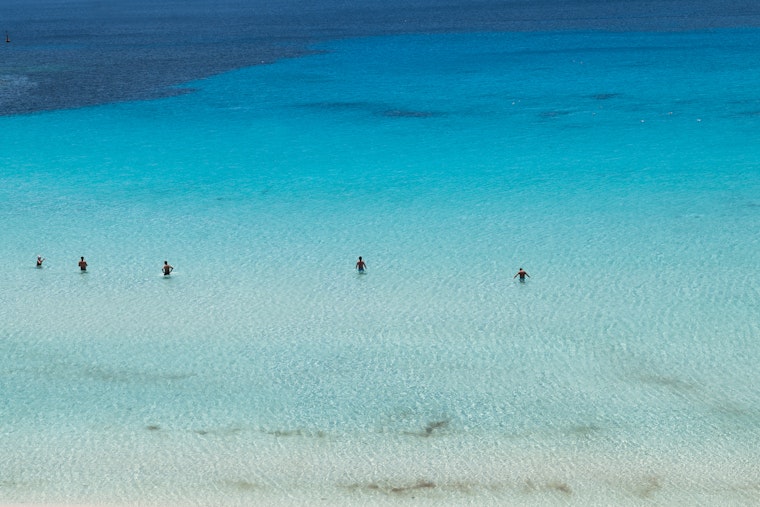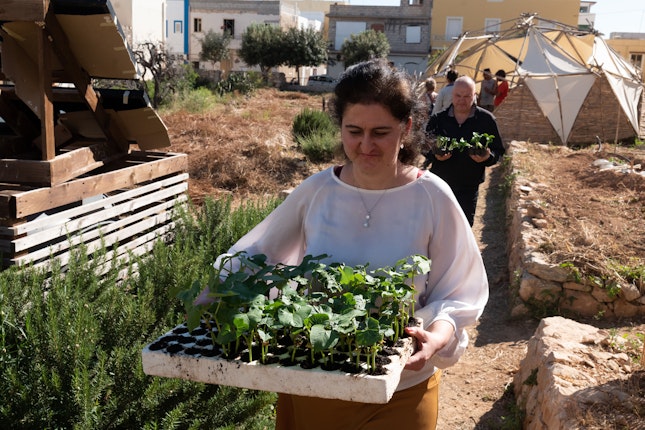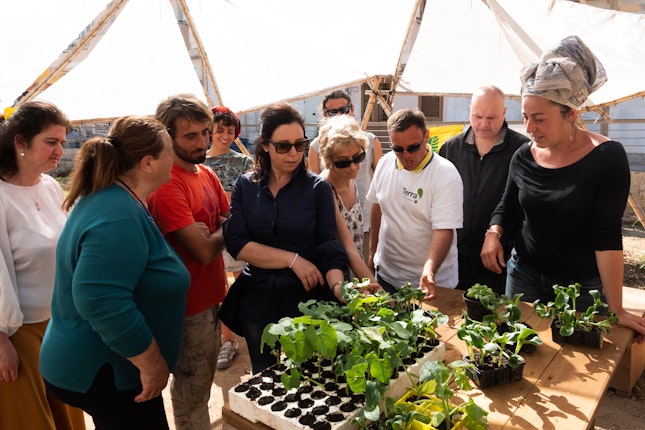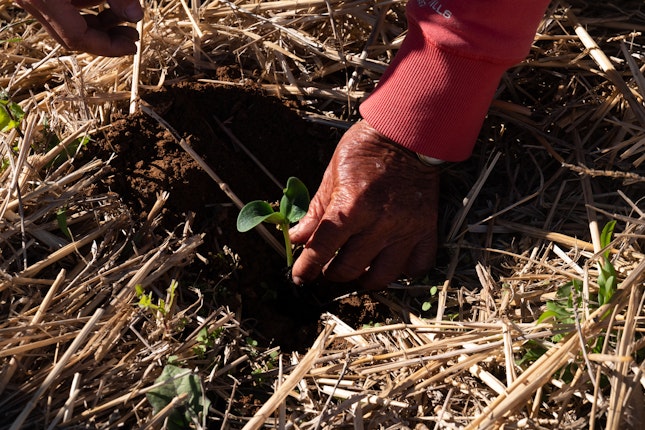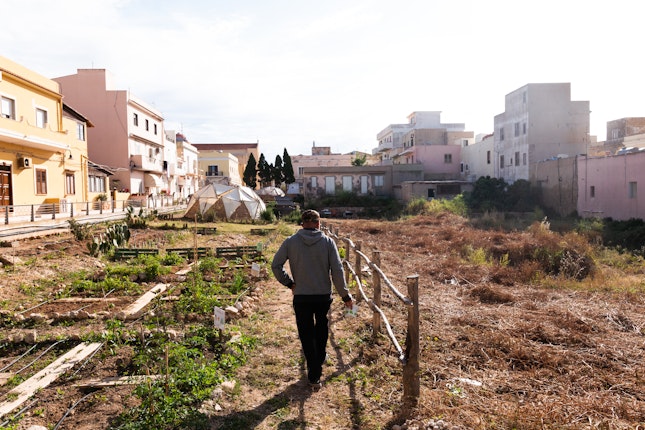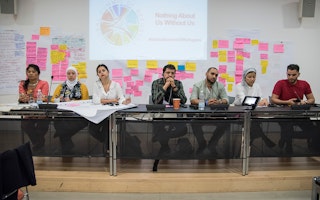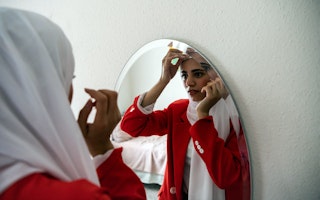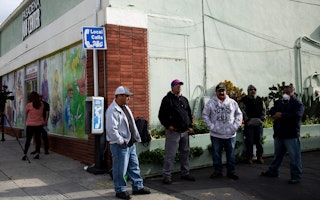A Garden Grows on Lampedusa
By Lucy Carrigan
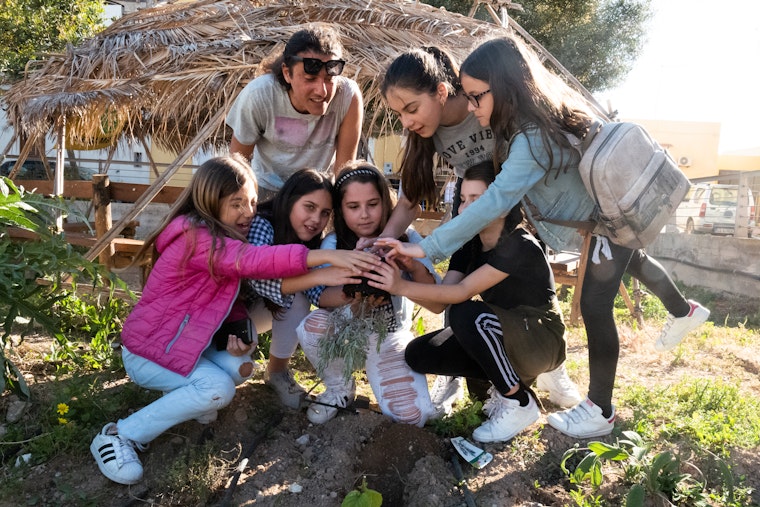
On a balmy summer’s evening, the locals are gathered at the community garden on the Italian island of Lampedusa. A ramshackle place, formerly an abandoned lot, and the length of a Lampedusa town block, but half as wide, the garden lies in the heart of town. A young woman in a mustard skirt and sparkling sneakers moves between rows of rosemary and lavender on one side, and aubergine, fava beans, and melon on the other. She is carrying a tray of seedlings and she is handling them with care. A small group of gardeners are gathered around a raised plot, deeply engrossed in the important task of planting basil. It’s a Monday, and the guests of Lampedusa’s Disability Daycare Centre are tending to their plot. Volunteers, friends, and family are here too. Banter and laughter reverberate all around.
This is something new.
For years, migrants leaving from the North Africa coastline set their compass for Lampedusa—a tiny speck of an island, 70 miles from the North African coast, which signals Europe. Beginning with the Arab Spring in 2011, and the ensuing upheaval, the number of arrivals rose significantly. Lampedusa, an island with a year round population of 6,000, was seeing as many as 4,000 people arriving in one week. The community, while quickly mobilizing to do what they could, often cooking pasta to feed everyone in their homes, was overwhelmed. Ask any Lampedusan and they will remember one date well: October 3, 2013, the day an overcrowded fishing boat, with over 500 people onboard, capsized just beyond the shore. Three hundred and sixty-six people drowned. It was a tragedy which awoke the world’s conscience, at least for a moment.
Migrants still lose their lives in the Mediterranean. But now, due in large part to a deeply flawed EU policy, which funds the Libyan coastguard to apprehend migrants in Libyan waters and return them to Libya (where ill treatment and torture await), arrivals to Lampedusa have reduced significantly.
When the Italian environmental organization Terra! came to Lampedusa in 2014, they found a community licking its wounds and finding its feet. Tourism was on the rebound which was of course welcome. But, they heard stories about a rich agricultural past which was now being subsumed by tourism, on an island where, today, the majority of fruits and vegetables are shipped from the mainland.
“It didn’t used to be this way,” says Silvia Cama, the project manager for Terra! Farming, she says, “has vanished.”
Locals wanted to find a way to reclaim their agricultural past.
Terra! launched the community garden project in response to this desire. They saw it as an opportunity to stand in solidarity with the locals as they continued to repair the fabric of their community.
When Cama started to work on the community garden, she heard tell of an ancient farmer on the neighboring island of Linosa who had been cultivating “ancient seeds,” passed down across generations. She gave him a call. This ancient farmer is Salvatore Ramirez. He is 70 years old, skin weathered from the sun, eyes a cobalt blue.
“Thank God I am getting old,” he says, blue jeans, blue shirt, cigarette in hand. “It means that I am well.”
Salvatore’s seeds started the community garden. Lentils. Fava. Barley. Capers. They are all thriving here and they all have sprung from an ancestry of ancient seeds which dates back to the 1800s.
Another ancient farmer’s legacy lives at the garden. His name was Pasquale Tonnicchi, and, although he was skeptical about the garden when he first heard about it, he was soon won over. In what Katia Billeci, the community garden’s field coordinator, and local Lampedusan, describes as a “vital transmission of knowledge,” he shared everything he knew. His influence is all over this ramshackle place.
Most of the gardening is done in complete harmony with the land. Lentils for example restore nitrogen in the soil. Tomatoes support basil, and so they are planted close together. Onions and garlic act as insect repellants and so they are planted on the outside of the plots to keep bugs away. The low walls which surround the garden have been built using the ancient method, stone on stone, interweaving with stone. They retain moisture, and release that moisture into the soil.
“The plants are connected through a very friendly system,” Cama says, smiling.
So too, more and more, is the community.
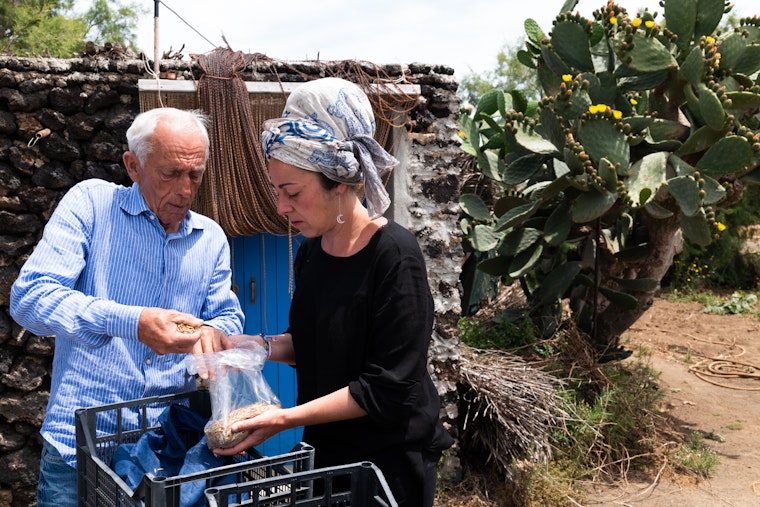
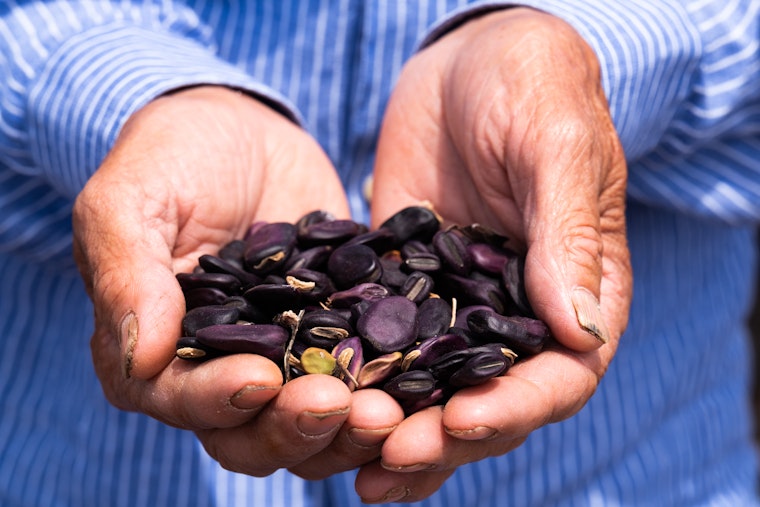
Maria Leduisi runs the Lampedusa Disability Daycare Centre. She is a rehabilitation psychiatrist who came to Lampedusa for 15 days, 15 years ago, and she stayed. She always looks for ways to break down barriers between people with disabilities and the broader community. The community garden breaks down barriers.
“I’ve seen a social acceptability,” she says. “The community is less exclusive than before.”
Billeci sees something revolutionary in the garden.
“The garden connected two worlds that were not talking to each other,” she says.
Herminda has the sweetest voice and a happy demeanor. She talks about the picnics at the garden, which she loves. Silvia had a birthday party there the week before, she tells us, and she was invited. She loved that too. “I was here when there was nothing here,” she says. “I helped to restore the land and build this garden.” Nodding at the stone walls, she adds, “all of these stones were put in place by me.”
Celestina says the garden is a way to be around people. "I was born again in this garden after my mother died.” Celestina wanted to know my age and once we had established that she is a full decade older than I am, she was pleased. “I have more experience living on this earth than you do,” she noted.
The community garden on Lampedusa is in its fifth year. Now, an abundance of fresh vegetables grow here, alongside herbs like mint, rosemary, lavender, and basil. Ten locals tend their own garden plots. School children come too, to get down and dirty in the soil. It’s not unheard of for locals to stop by on their way home, in desperate need of rosemary or mint or some other crucial ingredient.
When it was at risk of losing funding last October, the Open Society Foundations offered their support.
“Even though the number of migrant arrivals are down, the people of Lampedusa have been and will continue to be deeply affected by migration to Europe,” says Open Society’s Giovanna Castagna. “People in search of safety or a better life will continue to arrive here. Harsh policies remain in place. Open Society Foundations’ support for the community garden is one small way to say to the people of Lampedusa, you are not forgotten. We stand with you.”
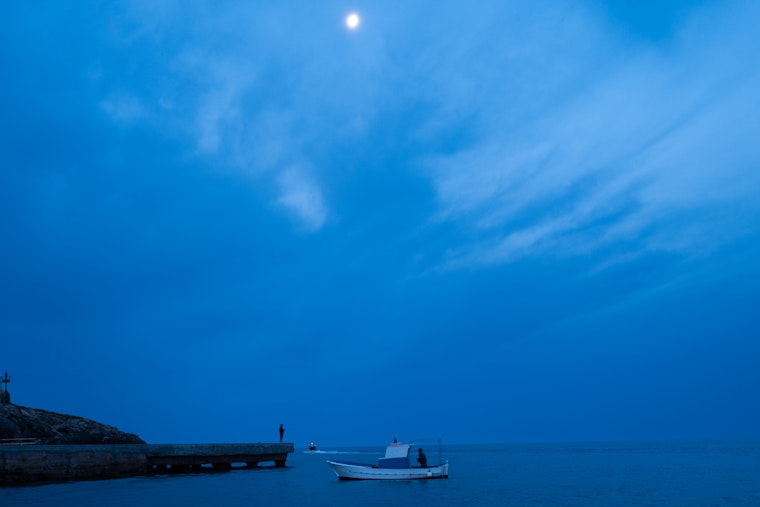
On that balmy summer evening, Pasquale Tonnicchi’s daughter, Anna Maria, is there with her mother. Her father died a year and a half ago and she feels emotional when she comes here.
“When I saw my father working on the land it was like he was playing an instrument,” she says. “There was a strong link between him and the land and they worked in harmony.
“We must look with attention to our roots, to our past. And that is what this project intends to do.”
As for Salvatore, he rarely comes to Lampedusa, too busy on the island of Linosa, where he also works as a tour guide. He does, however, monitor the progress of the garden—on Facebook.
“I am not a matusa!” he says with a laugh, using the Italian word for “old man,” his face crinkling up and his eyes shimmering with life.
Terra! Onlus is a grantee of the Open Society Foundations.
November 2021, Lucy Carrigan was a communications officer at the Open Society Foundations.
